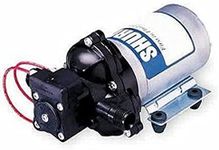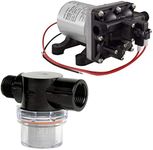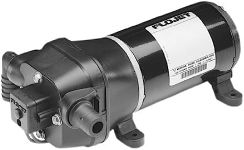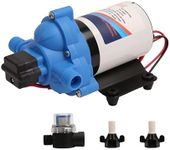Buying Guide for the Best Rv Water Pump
Choosing the right RV water pump is essential for ensuring a steady and reliable water supply in your recreational vehicle. The pump you select will affect your water pressure, noise levels, and overall comfort while on the road. To make the best choice, it's important to understand the key specifications and how they relate to your specific needs, such as the size of your RV, the number of people using water, and the types of appliances you have.Flow Rate (GPM)Flow rate, usually measured in gallons per minute (GPM), tells you how much water the pump can deliver in a minute. This is important because it affects how strong your water flow will be at sinks, showers, and other outlets. Lower flow rates (around 1-2 GPM) are suitable for small RVs with minimal water use, while higher flow rates (3-5 GPM) are better for larger RVs or if you have multiple people using water at the same time. To pick the right flow rate, consider how many water fixtures you’ll use at once and whether you want a strong shower or just basic water flow.
Pressure (PSI)Pressure, measured in pounds per square inch (PSI), indicates how forcefully the water is pushed through your pipes. This is important for ensuring that your shower and faucets work well and that appliances like water heaters function properly. Lower PSI (30-40) is fine for basic needs, but if you want a more powerful shower or have longer plumbing runs, look for pumps with higher PSI (up to 60). Match the pump’s pressure to your RV’s plumbing and your comfort preferences.
Power Consumption (Amps)Power consumption, measured in amps, tells you how much electricity the pump uses. This matters because RVs often have limited electrical capacity, especially when running on batteries. Pumps with lower amp draw are more energy-efficient and better for off-grid use, while higher amp pumps may provide more power but drain your battery faster. Choose a pump that balances your need for water flow with your available electrical resources.
Noise LevelNoise level refers to how loud the pump is when operating. Some pumps are much quieter than others, which can make a big difference in a small RV, especially at night. If you’re sensitive to noise or plan to use the pump while others are sleeping, look for models known for quiet operation. Manufacturers may describe pumps as 'quiet' or 'silent,' but reading user reviews can also help you gauge real-world noise levels.
Self-Priming CapabilitySelf-priming means the pump can start moving water even if there’s some air in the line, which is useful if your water tank runs dry or if you need to draw water from a lower source. Pumps with good self-priming ability are more reliable and easier to use, especially if you move your RV often or use external water sources. If you want hassle-free operation, especially in varied conditions, prioritize self-priming pumps.
Automatic Shut-OffAutomatic shut-off means the pump turns itself off when you’re not using water, which helps prevent damage and saves energy. This feature is important for convenience and safety, as it stops the pump from running dry or overheating. If you want a set-it-and-forget-it experience, look for pumps with built-in automatic shut-off.
Compatibility with Plumbing SizeCompatibility with your RV’s plumbing size ensures the pump will fit and work properly with your existing pipes and fittings. Most RVs use standard sizes, but it’s important to check the inlet and outlet sizes of the pump and match them to your system. This avoids leaks and installation headaches. Always verify your RV’s plumbing size before choosing a pump.



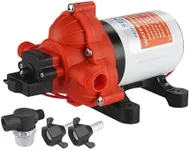

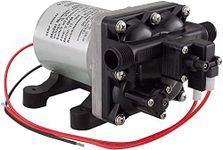
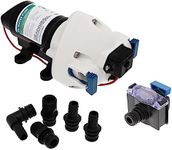
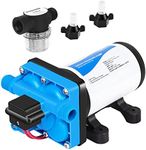

![[Upgraded Version] AOFOLO 42-Series](https://images-proxy.bestreviews.guide/QkhIJ_e56ITbgqXstQCwSz3naJM=/0x150/https://m.media-amazon.com/images/I/512md5zTNmL._AC_CX679_.jpg)
